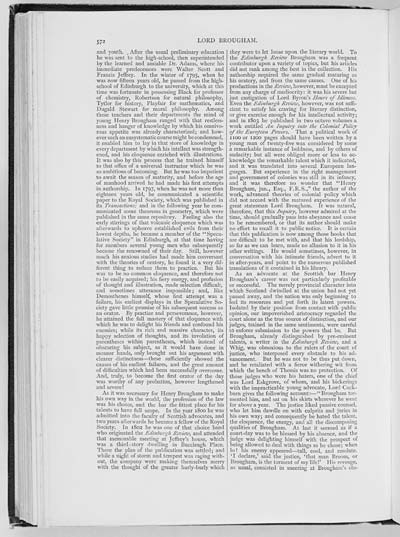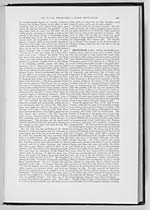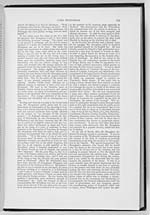Volume 3 > Half-Volume 6
(218) Page 572
Download files
Individual page:
Thumbnail gallery: Grid view | List view

572 and youth. After the usual preliminary education he was sent to the high-school, then superintended by the learned and amiable Dr. Adams, where his immediate predecessors were Walter Scott and Francis Jeffrey. In the winter of 1795, when he was now fifteen years old, he passed from the high- school of Edinburgh to the university, which at this time was fortunate in possessing Black for professor of chemistry, Robertson for natural philosophy, Tytler for history, Playfair for mathematics, and Dugald Stewart for moral philosophy. Among these teachers and their departments the mind of young Henry Brougham ranged with that restless- ness and hunger of knowledge by which his omnivo- rous appetite was already characterized; and how- ever such an unsystematic course might be condemned, it enabled him to lay in that store of knowledge in every department by which his intellect was strength- ened, and his eloquence enriched with illustrations. It was also by this process that he trained himself to that office of a universal instructor which he was so ambitious of becoming. But he was too impatient to await the season of maturity, and before the age of manhood arrived he had made his first attempts in authorship. In 1797, when he was not more than eighteen years old, he communicated a scientific paper to the Royal Society, which was published in its Transactions; and in the following year he com- municated some theorems in geometry, which were published in the same repository. Feeling also the early stirrings of that volcanic eloquence which was afterwards to upheave established evils from their lowest depths, he became a member of the '' Specu- lative Society" in Edinburgh, at that time having for members several young men who subsequently became the renowned of their day. Still, however much his anxious studies had made him conversant with the theories of oratory, he found it a very dif- ferent thing to reduce them to practice. But his was to be no common eloquence, and therefore not to be easily acquired; his fiery energy, and profusion of thought and illustration, made selection difficult, and sometimes utterance impossible; and, like Demosthenes himself, whose first attempt was a failure, his earliest displays in the Speculative So- ciety gave little promise of his subsequent success as an orator. By practice and perseverance, however, he attained the full mastery of that eloquence with which he was to delight his friends and confound his enemies; while its rich and massive character, its happy selection of thoughts, and its involution of parentheses within parentheses, which instead of obscuring his subject, as it would have done in meaner hands, only brought out his argument with clearer distinctness�these sufficiently showed the causes of his earliest failures, and the great amount of difficulties which had been successfully overcome. And, truly, to become the first orator of the day was worthy of any probation, however lengthened and severe! As it was necessary for Henry Brougham to make his own way in the world, the profession of the law was his choice, and the bar the fittest place for his talents to have full scope. In the year 1800 he was admitted into the faculty of Scottish advocates, and two years afterwards he became a fellow of the Royal Society. In 1802 he was one of that choice band who originated the Edinburgh Review, and attended that memorable meeting at Jeffrey's house, which was a third-story dwelling in Buccleugh Place. There the plan of the publication was settled; and while a night of storm and tempest was raging with- out, the company were making themselves merry with the thought of the greater hurly-burly which they were to let loose upon the literary world. To the Edinburgh Review Brougham was a frequent contributor upon a variety of topics, but his articles did not rank among the best in the collection. His authorship required the same gradual maturing as his oratory, and from the same causes. One of his productions in the Review, however, must be excepted from any charge of mediocrity: it was his severe but just castigation of Lord Byron's Hours of Idleness. Even the Edinburgh Review, however, was not suffi- cient to satisfy his craving for literary distinction, or give exercise enough for his intellectual activity; and in 1803 he published in two octavo volumes a work entitled An Inquiry into the Colonial Policy of the European Powers. That a political work of 1100 or 1200 pages should have been written by a young man of twenty-five was considered by some a remarkable instance of boldness, and by others of audacity; but all were obliged more or less to ac- knowledge the remarkable talent which it indicated, and it was translated into several European lan- guages. But experience in the right management and government of colonies was still in its infancy, and it was therefore no wonder that "Henry Brougham, jun., Esq., F.R.S.," the author of the work, advanced theories of colonial policy which did not accord with the matured experience of the great statesman Lord Brougham. It was natural, therefore, that this Inquiry, however admired at the time, should gradually pass into abeyance and cease to be remembered, or that its author should make no effort to recall it to public notice. It is certain that this publication is now among those books that are difficult to be met with, and that his lordship, so far as we can learn, made no allusion to it in his other writings. He would sometimes, however, in conversation with his intimate friends, advert to it in after-years, and point to the numerous published translations of it contained in his library. As an advocate at the Scottish bar Henry Brougham's career was not particularly profitable or successful. The merely provincial character into which Scotland dwindled at the union had not yet passed away, and the nation was only beginning to feel its resources and put forth its latent powers. Isolated by their position from contact with public opinion, our impoverished aristocracy regarded the court alone as the true source of distinction, and our judges, trained in the same sentiments, were careful to enforce submission to the powers that be. But Brougham, already distinguished by pre-eminent talents, a writer in the Edinburgh Review, and a Whig, was obnoxious to the rulers of the court of justice, who interposed every obstacle to his ad- vancement. But he was not to be thus put down, and he retaliated with a fierce withering wit from which the bench of Themis was no protection. Of those judges who were his haters, one of the chief was Lord Eskgrove, of whom, and his bickerings with the impracticable young advocate, Lord Cock- burn gives the following account:�"Brougham tor- mented him, and sat on his skirts wherever he went for above a year. The justice liked passive counsel, who let him dawdle on with culprits and juries in his own way; and consequently he hated the talent, the eloquence, the energy, and all the discomposing qualities of Brougham. At last it seemed as if a court-day was to be blessed by his absence, and the judge was delighting himself with the prospect of being allowed to deal with things as he chose; when lo! his enemy appeared�tall, cool, and resolute. 'I declare,' said the justice, 'that man Broom, or Brougham, is the torment of my life!' His revenge, as usual, consisted in sneering at Brougham's elo-
Set display mode to:
![]() Universal Viewer |
Universal Viewer | ![]() Mirador |
Large image | Transcription
Mirador |
Large image | Transcription
Images and transcriptions on this page, including medium image downloads, may be used under the Creative Commons Attribution 4.0 International Licence unless otherwise stated. ![]()
| Biographical dictionary of eminent Scotsmen > Volume 3 > Half-Volume 6 > (218) Page 572 |
|---|
| Permanent URL | https://digital.nls.uk/74514710 |
|---|---|
| Attribution and copyright: |
|
| Description | Volume III. Contains names alphabetically from Macadam to Young. |
|---|

